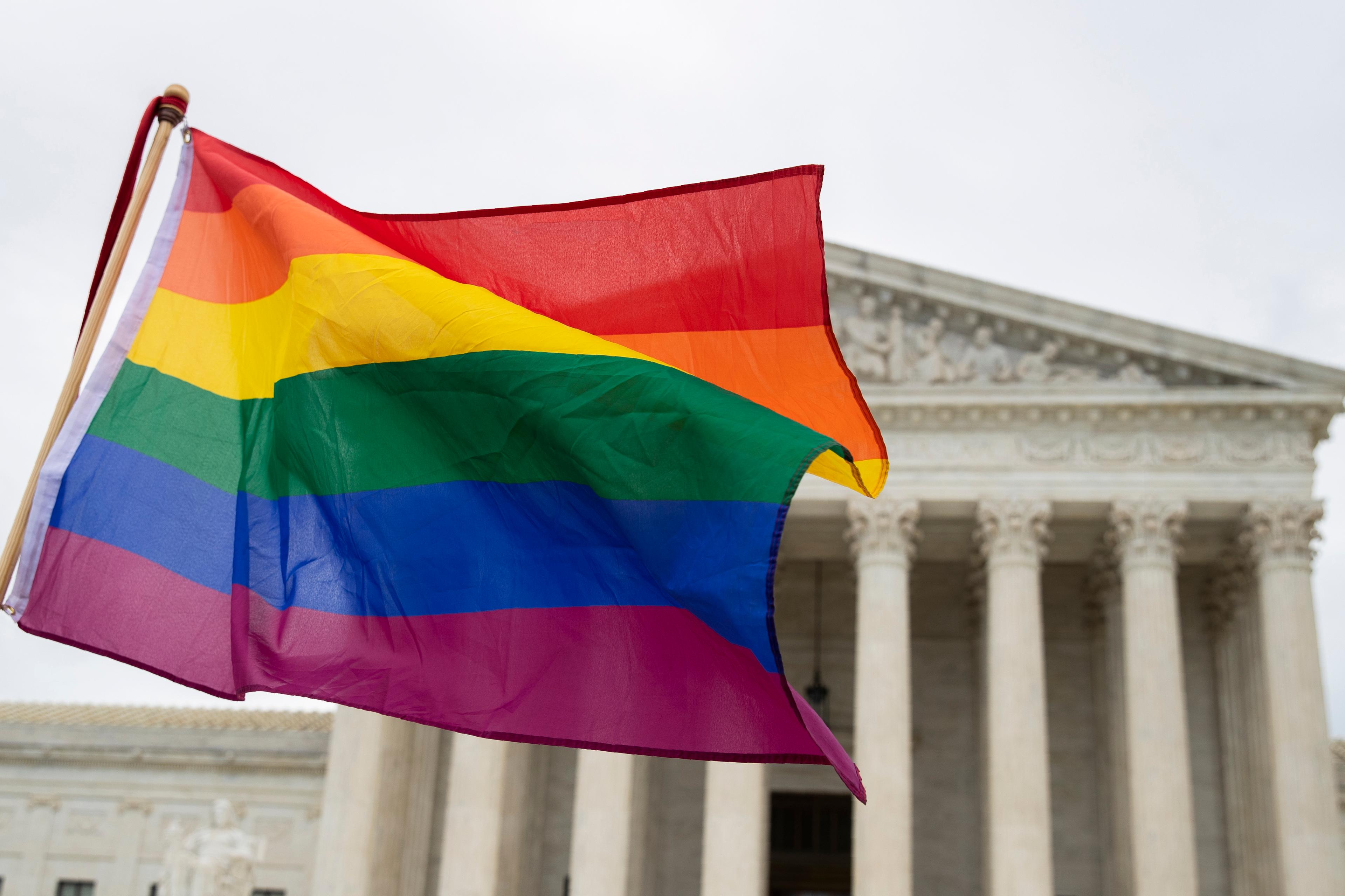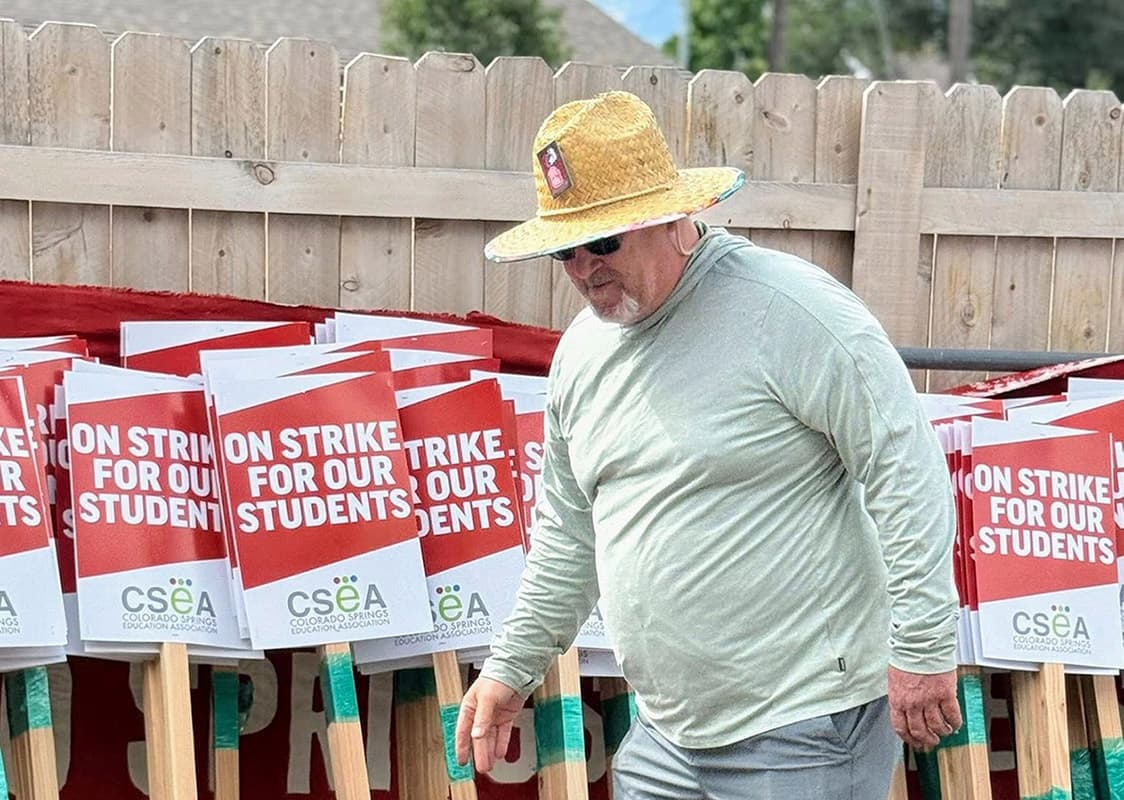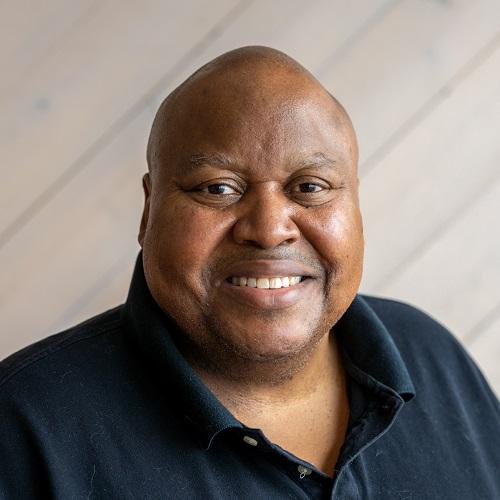
Phil Weiser said his office will be bringing three lawyers on board in the near future … and if you wanted to speculate that the new hires were in response to Donald Trump, Colorado’s Attorney General probably wouldn’t try to dissuade you.
“If you look at it, we have two huge responsibilities; what I might call the ordinary work that we've been doing and that we'll continue to do, and then this extraordinary work that we have to do in response to (the Trump administration’s) series of harmful and lawless actions,” Weiser told Colorado Matters Senior Host Ryan Warner. “We have day jobs that we're doing, serving clients and the state government, serving the people of Colorado and we have this unusual situation of a Trump administration acting lawlessly and harmfully.”
“That three is honestly a lot lower than what we really (need) because people in our office are stepping up above and beyond to help us meet this moment.”
President Trump has signed more than 150 executive orders since coming into office in January, in areas ranging from public health to community service. On Thursday, the US Supreme Court will hear arguments on whether to end birthright citizenship. Weiser has filed 20 lawsuits so far trying to halt those and other executive orders in an effort, he said, to protect Coloradans.
“Every single one of these executive orders I look at and ask two questions,” Weiser said. “First, is Colorado going to be harmed? Public health funding to help protect Colorado against infectious diseases or to support behavioral health? The AmeriCorps volunteers, the birthright citizenship; Coloradans are affected profoundly in these cases.”
“And there's a second question. Did the Trump administration violate the law? And if they did, if what they did is illegal and it's harming Colorado, I will sue to fight for Colorado.”
In the conversation, Weiser also addressed other issues, including Congress and the Judicial branches’ roles in serving as brakes on the Trump administration, whether businesses in the state may be taking advantage of the new series of tariffs to price gouge consumers, and his thoughts on the President’s desire to free former Mesa County clerk Tina Peters from jail.
This interview has been edited for length and clarity.
Ryan Warner: I want to start with birthright citizenship. The U.S. Supreme Court hears oral arguments tomorrow over whether to preserve it. Colorado is a party to one of several cases combined, what will you be listening for?
Phil Weiser: There are two issues in the case. It's worth acknowledging both of them. One is the merits of the case and whether or not the President, in executive order, can override the 14th Amendment, the plain language that says, "If you're born here, you're a citizen." And it's worth noting that the Supreme Court decided that issue over a century ago. So this is a brazen attack on a constitutional right for people who are here in this country, who were born here, who are worried about how it affects them.
The second issue is whether or not you're going to require every state in the union or every person to bring their own case to have the legal protection as to them. There is a risk that the injunction that the court will grant could say, "Well, Colorado was in the case, but Idaho wasn't, therefore, the people of Colorado have the benefit of birthright citizenship, but the people of Idaho didn't challenge this executive order, they don't." That would be an unworkable standard, because what would happen if you're born in Idaho and you moved to Colorado, are you not a citizen or do you become a citizen? Or if you're in Colorado, you move to Idaho, do you lose your citizenship? I'm going to be listening for both issues, the merits of the case and how the injunction that is issued is crafted.
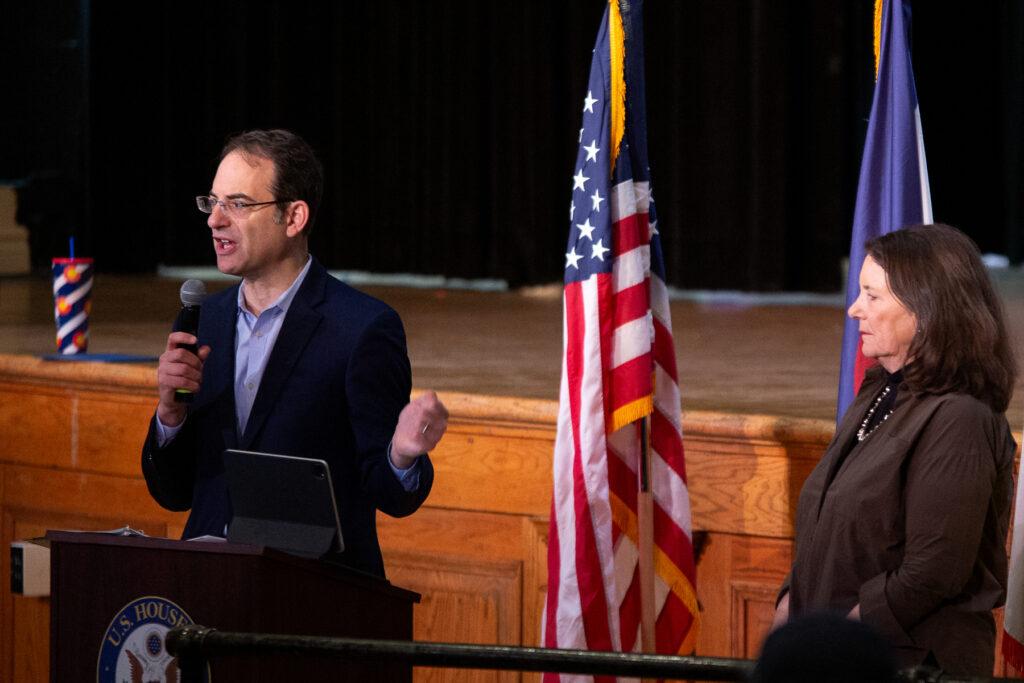
Warner: I'm not a legal eagle by any means. That patchwork approach sounds insane to me, that's a possibility?
Weiser: Theoretically, it is a possibility, and the Trump administration has ... how should I say this? They've not leaned into the merits. The merits of this case are, to my mind, pretty straightforward. The Trump administration is on basically very weak legal ground. They are going to lose on the merits, they should lose on the merits. They've leaned more into this question about should the injunction not be a so-called universal injunction and should it be somehow more tailored based on who brought the case. I agree, the results of a tailored injunction in this birthright citizenship case would be unworkable and problematic.
Warner: Are you concerned that the court has taken it up? Does that indicate to you that they're looking to change something?
Weiser: I think this is the case of great importance and I think the court responsibly took this case. I believe they're going to rule against President Trump and that's going to be important for the Republic, to know the Supreme Court is a check on unconstitutional and harmful actions for many Americans, people who are born here and are citizens because they're born here, this case has critical significance, it's important the court validate their right to be a citizen.
Warner: Do you think birthright citizenship has been abused?
Weiser: I have to say, I think that there's a principle here that's crucial, and the principle is America is an inclusive land and we need to fix our immigration system, but I'll tell you one thing they don't need to fix: If you're born here, you are a citizen. There are countries around the world that have tried to create second-class citizens or have tried to create other status where people aren't welcomed, that's not been the case in the US. My family came here as refugees, we've been welcomed, I want to keep that principle.
Warner: Indeed. In April, the Trump administration canceled around $400 million in funding for AmericaCorps, the federal community service program. Colorado's lieutenant governor said most of this state's 37 AmeriCorps programs would be affected.
Phil Weiser, you've also filed lawsuits in response to executive orders around voting restrictions and public health, what's your filter to decide if Colorado should get involved specifically?
Weiser: Every single one of these executive orders, I look at and ask two questions. First, is Colorado going to be harmed? The ones you just went through, public health funding to help protect Colorado against infectious diseases or to support behavioral health, the AmeriCorps volunteers, the birthright citizenship, Coloradans are affected profoundly in these cases. And there's a second question: did the Trump administration violate the law? And if they did, if what they did is illegal and it's harming Colorado, I will sue to fight for Colorado.
Warner: Many of these are multi-state lawsuits, some of them you originate, some of them you join. Do you find it's the usual suspects, Democratic AGs, or might we find some surprising bedfellows in some of this?
Weiser: I'm waiting for a Republican AG to join one of our cases, and I'll tell you, the tariff case, for example, one of the 20 we filed, I know the Republican AGs who look at these tariffs and they ask, "Boy, this is a pretty sketchy legal basis for the type of tariffs that are being imposed." And I'll tell you, there are a lot of judges who've been appointed by Republican presidents, including President Trump, who've ruled against the Trump administration. But here's the sad reality, and I saw this earlier, if you're a Republican attorney general and you call out one of the actions of this president as unconstitutional, there will be negative consequences, you could be primaried, and so, thus far, we haven't seen those voices speak up. We need those voices to speak up, Republican AGs, Republican members of Congress. When we defend our republic and we defend the Constitution, it should not be a partisan issue.
Warner: In a world of limited resources, what must your office say no to or patrol less as the top law enforcement official, because there are these lawsuits, many of them?
Weiser: We're stretching ourselves as thin as we can and the amount of horsepower that we are getting from people working really hard because they believe in the work we're doing right now is enabling us to avoid just the situation that you're raising, which is we have day jobs, work that we're doing, serving clients and the state government, serving the people of Colorado, and we have this unusual situation of a Trump administration acting lawlessly and harmfully, where they're not asking lawyers, "Can I do this?" They're instead going ahead and doing things like dismantling AmeriCorps, which is a program set up by Congress; only Congress can end it. And here we are, fighting for a basic principle of separation of powers, fighting for a program that does so much good, fighting the opioid crisis, helping veterans, helping kids read. These are not partisan issues; these have been bipartisan, but this administration's lawless, harmful actions demand a response.
Warner: So your office is spread thin, what does that mean? I guess fundamentally, I hear you saying, "There's nothing we are not doing as a result."
Weiser: That's correct.
Warner: That's surprising to me.
Weiser: Essentially, if you look at it, we have two huge responsibilities: what I might call the ordinary work that we've been doing and that we'll continue to do, and then this extraordinary work that we have to do in response to this administration's series of harmful and lawless actions. And right now, I've only asked the Colorado legislature for three more full-time equivalent people, and that three is honestly a lot lower than what we really are using, because people in our office are stepping up above and beyond to help us meet this moment.
Warner: Are you getting those three?
Weiser: We are.
Warner: How soon do they come on board?
Weiser: As soon as we can hire them. We're posting literally right now, we just had the legislative session complete, we're going to need those reinforcements. But we're working really hard and it's a testament that we have a team that we've built over the last six years. Had I come to office from a flat start and hadn't built the team we had, I don't know that we could meet this moment. But with the team we have, I'm proud of how hard and effectively they're working.
Warner: Are you keeping a tally of what this costs taxpayers, and if so, can you share that with us? Is there a separate balance sheet for the Trump stuff?
Weiser: There's not a separate balance sheet. We know we have people working hard and long, but basically, what we're doing is we're working harder and working smarter. The only additional burden, if you will, are these three people that we're getting from the legislature. Other than that, we're doing this all with existing resources.
Warner: Phil, consumer protection is a key role for your office and I want to have you put that hat on for this next question. Many businesses seem to be raising prices in light of tariffs. How do we know that there aren't among them opportunists? How do we know that this isn't price gouging under a tariff mask?
Weiser: I want to underscore what is the core principle that we look for, which is deception. Are businesses saying something like a tariff surcharge and what is ultimately being sold isn't affected by the tariff at all? That would be a misrepresentation. But businesses who just raise their prices because we're in an environment of raising prices and aren't misrepresenting what they're doing, there's nothing to stop them, and there is a lot of disruption in the marketplace, both fears about the tariffs and actual effects, and sadly, we're going to feel those effects. We're bringing this case to stop these tariffs, because their basis themselves is, to my mind, highly suspect. But until and unless these tariffs end, there are going to be effects from the tariffs.
Warner: We said earlier that your office is spread pretty thin, both with the daily work and then the question of the executive orders that you're opposing, do you have people monitoring for those kinds of false claims that might be under the guise of inflation or tariffs?
Weiser: We do. And for consumers out there who see something that looks like it's a scam, it's a fraud, it's deception, stopfraudcolorado.gov is where you can report that. We get over 20,000 such reports a year. We share what the categories are, things like contractor fraud or impostor fraud. There are a lot of them out there. It's hard for us because we don't have enough resources to go after every single scam artist, fraudster or irresponsible business, but we do our very best to look for patterns, to educate consumers. And one thing I can say, back to the earlier conversation, we don't have people in our consumer protection unit who are now being diverted to work on these cases; they're all doing the same work they were doing six months ago, and we are going to make sure we do everything we can effectively.
I do want to share some bad news, though. Because the Consumer Financial Protection Bureau at the federal level is being dismantled, and we're fighting that in court too, that does mean more of a burden is on us because we're losing the otherwise valuable counterpart, the partner of the Consumer Financial Protection Bureau.
Warner: You could rely to some extent on the federal office, the federal agency, to pick up the mantle?
Weiser: Correct. We actually have a case that we're working on with them, and we're now going to have to pick up more of that mantle ourselves because that agency is being gutted and illegally dismantled. Ideally, we're going to win that in court, but some of the damage is already done.
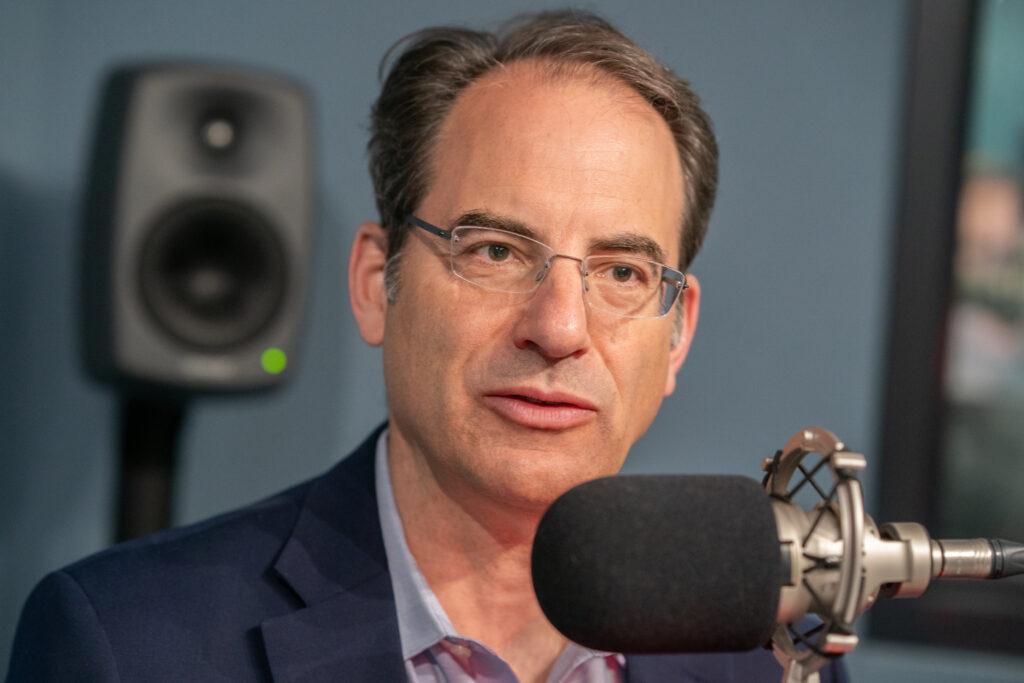
Warner: It seems to me that we've seen only a little pushback on this administration from its co-equal branch, Congress. And indeed, that puts a lot of pressure on the judiciary, and of course, the assumption is that the administration complies then with the judiciary. What is your sense of how that system is working right now?
Weiser: A couple of points I want to say. In the cases that we have brought, there has been, by and large, I'd call it mildly encouraging signs that they're working to follow the rulings of courts. That is, I would say, mildly encouraging.
What is discouraging is in other cases, including the case involving Mr. Garcia, there are claims that due process of law, as guaranteed by the 14th Amendment, is being ignored by this administration and they are not showing the same commitment to following court orders. To your basic question, 100 percent, we need Congress making clear that no administration is above the law, due process of law applies to every person here in the US, and that we cannot live in a society where someone can be picked off the street, shipped to another country without any independent judicial process, without legal process. That is core to our nation and that has to be something that we see as a core bipartisan commitment from Congress, not just the judicial branch.
Warner: You're speaking of Kilmar Abrego Garcia?
Weiser: Correct.
Warner: This seems to be a time of just incredible polarization and tribalism. Does the law still unite us?
Weiser: I will say a few things on this. It better unite us, the rule of law better remain the foundation of our republic or we lose everything. The Supreme Court has a majority of justices appointed by Republican presidents, and I am saying, and we'll come back and revisit this, they're going to rule against the Trump administration in this birthright citizenship case, and that is an important principle that the law governs, and it's not all what party do you belong to. I also want to acknowledge Jeff Hurd, a member of Congress from Colorado, who did criticize President Trump's pardons of January 6th criminals, who engaged in attacking police officers or vandalism of public property. That is to me a question of the rule of law, and after January 6th happened, I led a coalition of 47 state attorneys general to call out January 6th as a dangerous and lawless attack on the Capitol. We need voices calling out lawless action, we need voices calling for the rule of law, and it can't just be Democratic voices.
Warner: Any number of Coloradans, by the way, are associated with January 6th, so that's something that hits home as well. The Justice Department and the President himself on Truth Social apparently wish to free Tina Peters. She's in prison after a jury found the former Mesa County clerk guilty on seven counts, four of them felonies related to her duties as an election official. Your office has supported the local DA in that case, what can you say?
Weiser: Well, I mentioned before Jeff Hurd, who's from Mesa County, now I should talk about Dan Rubinstein from Mesa County. Dan is the local DA.

Warner: A Republican.
Weiser: A Republican. And Dan and I worked together on this prosecution of Tina Peters. There is nothing, as Dan Rubinstein has explained, about this prosecution that was political. It was about the rule of law, it was about defending the integrity of elections and making sure that someone who takes an oath to operate in a legitimate and legal fashion doesn't undermine the oath of office, doesn't break the law that was tried to a jury of her peers. She was convicted, there's now a proceeding in federal court, it's called habeas corpus, that's moving forward. There's going to be appeals in state court. We're handling that work, and we're going to handle it with integrity and commitment to the rule of law, and we're not going to be intimidated by the administration that has shown a disregard for the rule of law and a willingness to try to essentially use fear tactics. I'm not going to be intimidated, I'm not going to be afraid, I'm going to defend the rule of law.
Warner: Now, the question might arise for folks, why doesn't the President just pardon Tina Peters? The point here is these are state charges, so the President doesn't have that authority.
Weiser: That's correct.
Warner: Do you see any avenue for an overturning or a freeing of Tina Peters?
Weiser: This question went to a couple of former Republican US attorneys here in Colorado, and they answered it by saying, no. There's no way in which state charges can somehow be countermanded by even the federal Justice Department. We have our own system, this is what our constitution calls federalism. We enforce our criminal laws, and the federal government can't hijack that system; they have to honor it, we are a separate sovereign.
Warner: If the administration began not to comply with rulings or cherry-picked which they abided by, what recourse does America have?
Weiser: There are a few points here that I would point to. First off, people in the administration who break the law, break court rulings, are going to put themselves in the crosshairs of courts and of contempt sanctions, sanctions that can be enforced by courts, that can rack up penalties. Individuals who are lawyers, for example, could be disbarred. There can be other consequences. So think about Rudy Giuliani, who went ahead after the election litigation engaged in a bunch of irresponsible and even illegal activity. He's been held accountable, he's suffering consequences. So people in the Trump administration stand to suffer personally for being a part of this conduct. But to the point of the American public, this is something I'm always saying: we can't just win in the courts, we have to win in the court of public opinion. We need the American public to say it, and the opinion polls say this as much, that no president's above the law. The rule of law is sacrosanct to our republic; we all have to stand for it, and ultimately, Congress is going to have some power it can use if necessary. This is a make-or-break moment for our republic, I'm going to be fighting to preserve the rule of law, and we're going to need this to be something that every American gets behind.
Funding for public media is at stake. Stand up and support what you value today.

